Coffee Industry and News
Leadership Changes at the European Vending Association


Paolo Ghidotti Steps Down as EVA President
After more than 7 years of service, Paolo Ghidotti has left his role as President of the European Vending Association (EVA). Ghidotti, who served as President since November 2017, led the Association through significant changes, including the implementation of a new name and the expansion of membership services. Additionally, Ghidotti was the Chairman of the European Vending Machine Manufacturers Association (EVMMA).
Mihai Ungureanu Takes Over as Interim President
Mihai Ungureanu, the 1st Vice President of the EVA, will step in as the interim President. Ungureanu, who is also the President of the Romanian Vending Association (PRIV), was elected at the EVA Annual Assembly in Rome in 2017. The Executive Committee will ratify and vote on all new roles, including the new Vice President(s), at their next meeting.
The EVA expressed their gratitude to Ghidotti for his leadership, hard work, and dedication to the Association, and wished him well in his future endeavors.
The Association also congratulated Ungureanu on his new role and expressed their commitment to working closely with him to ensure a smooth transition.
In the vast and diverse world of coffee, coffee alternatives, and tea, Olivia has found her calling. As an author and a dedicated coffee and tea aficionado, her work for Cappuccino Oracle reflects her profound love and understanding of the intricate complexities found within these beverages. Olivia’s passion for the subject serves as both a catalyst for her creativity and a connection point with her audience.
Olivia’s appreciation for coffee, coffee alternatives, and tea blossomed at an early age. She discovered that these beverages invigorated her senses and stimulated her creative spirit. From the nuanced flavors of single-origin roasts to the captivating narratives intertwined with coffee, coffee alternatives, and tea trade and culture, Olivia found an unlimited source of inspiration in her daily cup.
Her love for these beverages and her talent for storytelling eventually converged at Cappuccino Oracle. As an author, Olivia’s mission is to illuminate the intricate tapestry that makes up the world of coffee, coffee alternatives, and tea. Her articles span a diverse range of topics, encompassing everything from the unique flavors of different brews to the sociocultural history intertwined with their cultivation and consumption.
Sustainable and Ethical Tea Sourcing
Coffee Forest Conservation Guide
Get inspired to protect coffee forests and discover how your choices can impact biodiversity and farmer livelihoods in ways you never imagined.

To conserve coffee forests, you can support sustainable practices that protect biodiversity and benefit local farmers. Engage with Participatory Forest Management Committees to promote responsible forest use in your community. Consider premium market opportunities for sustainably sourced coffee, as this increases income for smallholder farmers and enhances ecosystem resilience. Stay informed about regulations like the EU Deforestation Regulations, which impact local livelihoods. Collaborating with organizations focused on coffee conservation can provide the necessary training and resources for improvement. Explore how these efforts can create lasting change in coffee ecosystems and support agricultural sustainability.
Key Takeaways
- Coffee forests in Ethiopia are vital for biodiversity and serve as a genetic bank for Arabica coffee varieties crucial to the global coffee industry.
- Sustainable farming practices enhance the economic stability of smallholder farmers, increasing yields and access to premium markets for sustainably sourced products.
- Participatory Forest Management Committees (PFMCs) engage communities in responsible forest use, promoting conservation efforts amid increasing agricultural land demand.
- Economic benefits from forest coffee can boost farmer earnings by up to 30%, fostering rural community stability and resilience against climate change.
- Effective stakeholder engagement is essential to align conservation regulations with the needs of smallholder farmers, ensuring environmental sustainability and economic viability.
Overview of Coffee Forests

Coffee forests, particularly in Ethiopia, are fundamental ecosystems that not only support a rich diversity of plant and animal life but also safeguard the genetic resources of Arabica coffee. These forests act as a natural genetic bank, preserving various Arabica coffee varieties that are significant for the global coffee industry. By supporting this biodiversity, these ecosystems play an important role in maintaining ecological balance.
For hundreds of thousands of smallholder farmers, coffee forests provide considerable livelihoods. Their economic stability relies heavily on sustainable forest management practices that protect these important areas.
However, increasing population growth and the demand for agricultural land pose serious threats to remaining coffee forests, making conservation efforts urgent and necessary.
To combat these challenges, Participatory Forest Management Committees (PFMCs) have been established in Ethiopia. These committees promote responsible forest use and engage local communities in protecting their natural resources.
Importance of Sustainability

Sustainability in coffee farming isn't just about preserving nature; it also brings significant economic benefits.
By evaluating the environmental impact of your practices, you can make informed decisions that support both the ecosystem and your income.
Understanding these connections helps guarantee that your coffee cultivation aligns with broader conservation efforts.
Environmental Impact Assessment
Environmental impact assessments (EIAs) play an essential role in guaranteeing that coffee production aligns with ecological health and community well-being. By identifying potential adverse effects of coffee cultivation, you can make informed decisions that promote biodiversity and sustainable livelihoods.
Without EIAs, the risks of deforestation and habitat loss increase, undermining the ecological balance and contributing to climate change.
Here are some key benefits of implementing EIAs in coffee production:
- Biodiversity Protection: EIAs help assess the impact of coffee farming on local species, allowing for the conservation of wildlife habitats.
- Community Engagement: Involving local communities in the assessment process fosters stewardship and guarantees that conservation aligns with their cultural values and needs.
- Sustainable Practices: EIAs encourage practices like shade-grown coffee, which enhance biodiversity and improve soil health.
Ultimately, prioritizing environmental impact assessments in coffee production not only safeguards ecosystems but also strengthens the economic viability of smallholder farmers.
Healthy ecosystems lead to better yields and resilience against climate change, guaranteeing that both nature and communities thrive together.
Economic Benefits Analysis
The economic landscape of coffee farming is increasingly shaped by sustainable practices that benefit both the environment and the farmers. By adopting sustainable coffee practices, you can enhance the economic stability of smallholder farmers like yourself, ensuring that your livelihood remains intact amidst changing market demands.
Forest conservation plays an essential role here; it opens up access to premium markets that favor sustainably sourced products, potentially boosting your income.
When you integrate conservation efforts with coffee cultivation, you're not only protecting the environment but also promoting biodiversity. This biodiversity is vital for the long-term viability of coffee ecosystems, which directly impacts your farming success.
By participating in educational initiatives and utilizing available resources, you can improve your agricultural methods, leading to better yields and increased income while safeguarding forest ecosystems.
Investing in sustainable coffee production supports local economies and contributes to climate change resilience, ensuring a brighter future for coffee farming in vulnerable regions.
Ultimately, embracing these practices can lead to a more sustainable, profitable, and resilient coffee farming experience for you and your community.
Role of Smallholder Farmers
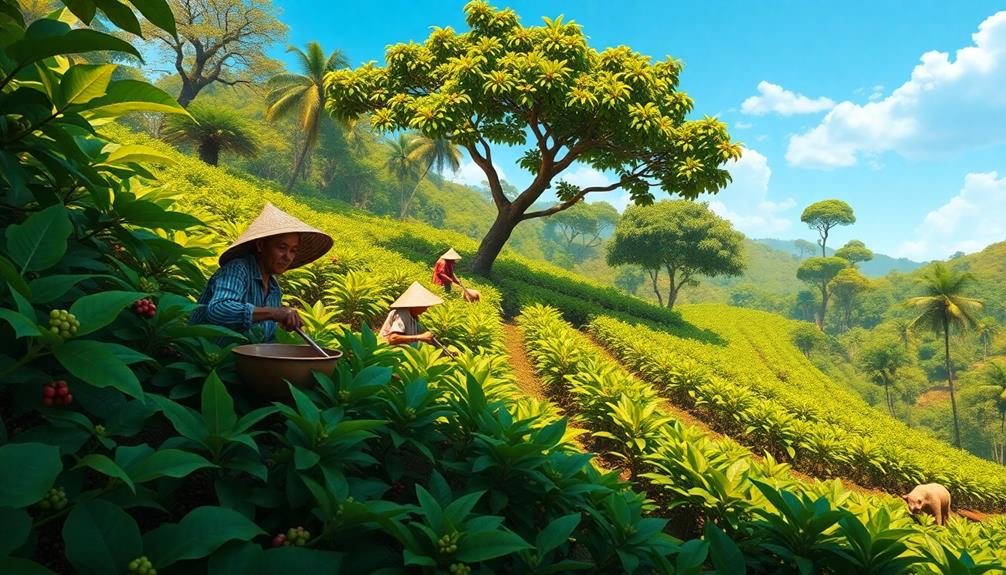
Smallholder farmers play a pivotal role in the global coffee landscape, accounting for about 70% of coffee production. Their involvement is essential for the coffee supply chain and the economic stability of rural communities.
However, these farmers often face significant challenges, including climate change and market fluctuations. That's why adopting sustainable practices is vital for enhancing their resilience and ensuring consistent yields.
Here are a few key reasons why supporting smallholder farmers matters:
- Biodiversity Preservation: Their farming practices can help protect diverse ecosystems, particularly in regions like Ethiopia.
- Livelihood Improvement: Empowering farmers through training and resources can boost incomes by up to 30%.
- Quality Enhancement: Initiatives supporting smallholders can improve the overall quality and marketability of forest coffee products.
EUDR Implementation Insights
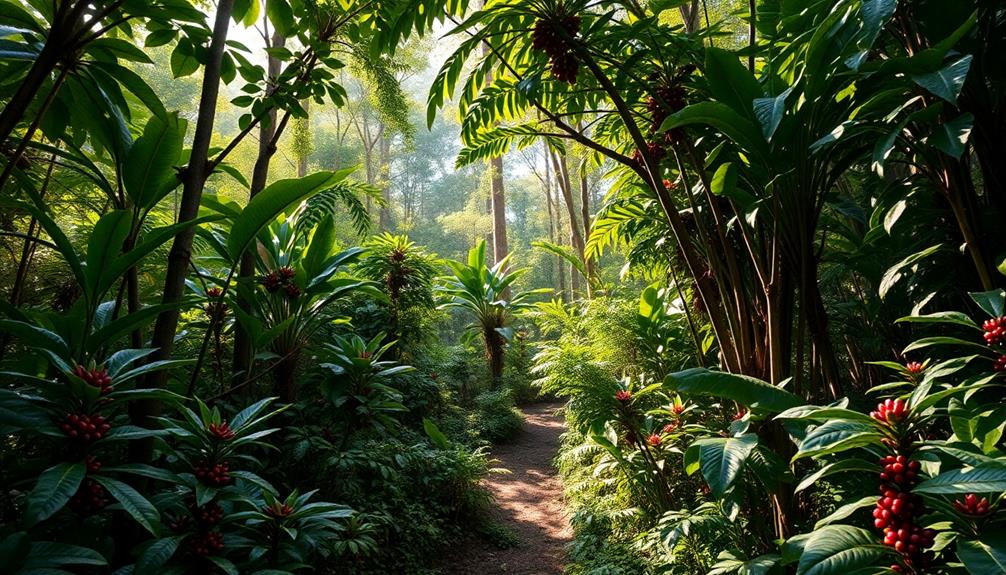
The delay in implementing the EU Deforestation Regulations (EUDR) has significant implications for both the environment and smallholder farmers like you.
Engaging stakeholders throughout this process is vital to guarantee that your needs are met while achieving sustainability goals.
As new deadlines are set, it's important to reflect on how these changes will affect your agricultural practices and livelihoods.
Regulation Delay Impact
How does the delay in implementing the EU Deforestation Regulations (EUDR) affect both environmental goals and the livelihoods of farmers? This postponement aims to balance conservation efforts with the economic realities of smallholder coffee farmers. While the intention is positive, the delay creates uncertainty for those whose livelihoods depend on coffee production.
Consider these important implications:
- Environmental Goals: The delay may slow down progress in combating deforestation, hindering efforts to protect essential ecosystems.
- Smallholder Farmers: With new deadlines, smallholder farmers face challenges in adapting to regulations that may greatly affect their operations and incomes.
- Regulatory Frameworks: Effective conservation practices require regulations that are well-informed and aligned with community needs, which the delay seeks to achieve.
In essence, while the delay offers a chance for a more thorough assessment of the EUDR, it also underscores the complexities of ensuring that both environmental sustainability and the livelihoods of coffee farmers are prioritized.
Balancing these interests is essential for fostering long-term conservation and economic stability.
Stakeholder Engagement Importance
With the postponement of the EU Deforestation Regulations (EUDR), it becomes increasingly clear that stakeholder engagement is vital for achieving effective environmental outcomes. Engaging smallholder farmers and local communities guarantees that their voices inform the decision-making process, helping to create regulations that are both effective and equitable. By incorporating diverse perspectives, you can drive thorough assessments that balance conservation efforts with the economic needs of agricultural producers.
Collaboration among stakeholders can optimize outcomes for biodiversity conservation and socio-economic stability in rural areas. The EUDR aims to establish a framework that addresses deforestation while promoting sustainable agricultural practices.
Here's a quick look at the importance of stakeholder engagement:
| Stakeholder Group | Role in Engagement | Expected Outcome |
|---|---|---|
| Smallholder Farmers | Provide local knowledge | Improved livelihoods |
| Local Communities | Share cultural insights | Enhanced conservation efforts |
| Policymakers | Develop informed regulations | Successful EUDR implementation |
TechnoServe's Conservation Efforts
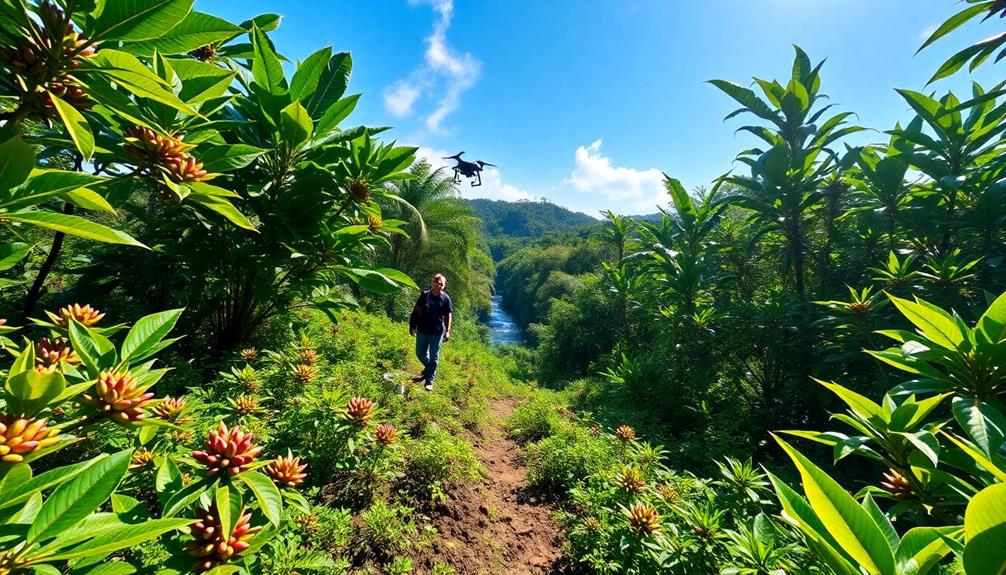
TechnoServe takes a proactive approach to conservation by partnering with organizations like Partnerships for Forests, enhancing forest conservation initiatives while promoting sustainable coffee farming practices in Ethiopia.
Their work focuses on protecting unique ecological habitats, particularly those linked to Ethiopia's Forest Coffee, which is crucial for both biodiversity and the livelihoods of smallholder farmers.
Through their efforts, TechnoServe provides essential training and resources to empower farmers, ensuring they adopt sustainable practices that benefit both the environment and their communities.
Key aspects of their conservation initiatives include:
- Promoting the economic potential of premium, sustainably produced forest coffee.
- Advocating for policies that align with environmental conservation and empower smallholder farmers.
- Collaborating with local and international stakeholders to strengthen conservation efforts.
Additionally, TechnoServe released "Ethiopia's Forest Coffee: An Illustrated Guide," highlighting the significance of coffee forests in maintaining biodiversity and supporting local communities.
By integrating conservation with economic viability, TechnoServe creates a sustainable framework that benefits farmers and protects crucial ecosystems.
Your involvement in these initiatives can further enhance the impact on Ethiopia's rich coffee heritage.
Ethiopian Arabica Coffee Guide

Ethiopian Arabica coffee is renowned for its unique flavors and rich heritage, making it a favorite among coffee enthusiasts worldwide. The "Ethiopian Arabica Coffee Guide," released by TechnoServe and Partnerships for Forests, aims to promote sustainable practices and forest conservation in Ethiopia.
This guide highlights the importance of the wild forests and semi-forests where Ethiopian Arabica coffee is primarily grown. These forests not only provide livelihoods for local communities but also serve as a crucial genetic bank, preserving the diverse varieties of Arabica coffee.
Additionally, studies have shown that coffee consumption can have health benefits, such as reducing the risk of certain diseases and enhancing mood, which may further encourage sustainable coffee practices by increasing consumer demand for ethically sourced products. By embracing coffee's health benefits, you contribute to a market that values both wellness and environmental sustainability.
Within the guide, you'll find valuable resources like cupping scores, flavor profiles, and maps, which can help you understand the origins and quality of Ethiopian coffee.
By emphasizing community stewardship, the guide empowers smallholder farmers to adopt sustainable practices that protect tropical forests while enhancing their market profitability.
As you explore the incredible world of Ethiopian Arabica coffee, remember that your choices can support both the environment and the farmers who cultivate this exquisite coffee.
Embrace the knowledge and tools provided in the Ethiopian Arabica Coffee Guide to enhance your appreciation for this remarkable beverage and contribute to its sustainable future.
Economic Impact of Forest Coffee
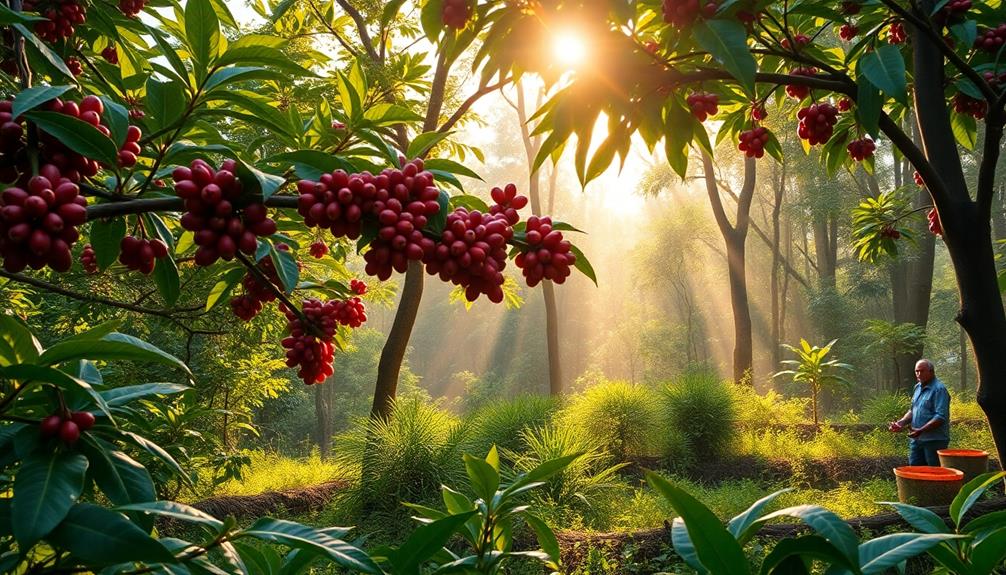
When you consider the economic impact of forest coffee, you'll see how it supports smallholder farmers by providing a sustainable income tied to environmental conservation.
Premium market opportunities encourage you to adopt sustainable practices, which can lead to higher profits.
Smallholder Farmer Benefits
For millions of smallholder farmers in Ethiopia, coffee isn't just a crop; it's a lifeline. With over 15 million people relying on forest coffee farming, the economic impact is profound.
By embracing sustainable practices, these farmers not only improve their own livelihoods but also contribute to the health of their communities and the environment.
Here are some key benefits you can expect:
- Increased Yields: Sustainable techniques can boost yields by up to 50%, providing a more stable income.
- Economic Stability: Empowering farmers with training and resources enhances their resilience against climate change and market fluctuations.
- Community Stewardship: Initiatives like Participatory Forest Management Committees foster a sense of ownership and responsibility in managing forest resources sustainably.
Premium Market Opportunities
The rise of premium market opportunities for forest coffee presents a significant economic advantage for smallholder farmers. By tapping into the unique flavor profiles of premium wild coffee sourced from Ethiopia, you can command higher market prices.
Sustainable harvesting practices not only enhance the quality of your coffee but also align with increasing consumer demand for ethically sourced products.
Partnerships between organizations like TechnoServe and local cooperatives help improve both the traceability and quality of forest coffee, making it more appealing to specialty coffee buyers. As consumers become more aware of the environmental benefits of forest coffee, there's greater demand for products that contribute to biodiversity preservation.
This increased interest encourages retailers to prioritize your sustainably sourced coffee, potentially boosting your profits. Establishing sustainable supply chains supports local economies and creates a win-win scenario for both the environment and you as a farmer.
Sustainable Income Strategies
Sustainable income strategies rooted in forest coffee production can considerably enhance your economic stability as a smallholder farmer. By embracing these practices, you not only contribute to conservation efforts but also boost your economic resilience.
Forest coffee offers a sustainable income source, with premium prices that can increase your earnings by up to 30% compared to conventional coffee. Additionally, incorporating practices such as herbal tea cultivation alongside coffee can diversify your income streams and provide health benefits from herbal teas.
To maximize these benefits, consider the following strategies:
- Implement sustainable cultivation practices: These methods not only improve your yields but also guarantee the long-term viability of your coffee farming.
- Collaborate with organizations: Partnering with groups like TechnoServe can give you access to training and resources, improving your harvesting techniques and market access.
- Invest in conservation: Every dollar you invest in sustainable coffee can generate up to four dollars in economic return for your community, creating a win-win for both you and the environment.
Panel Discussion Highlights
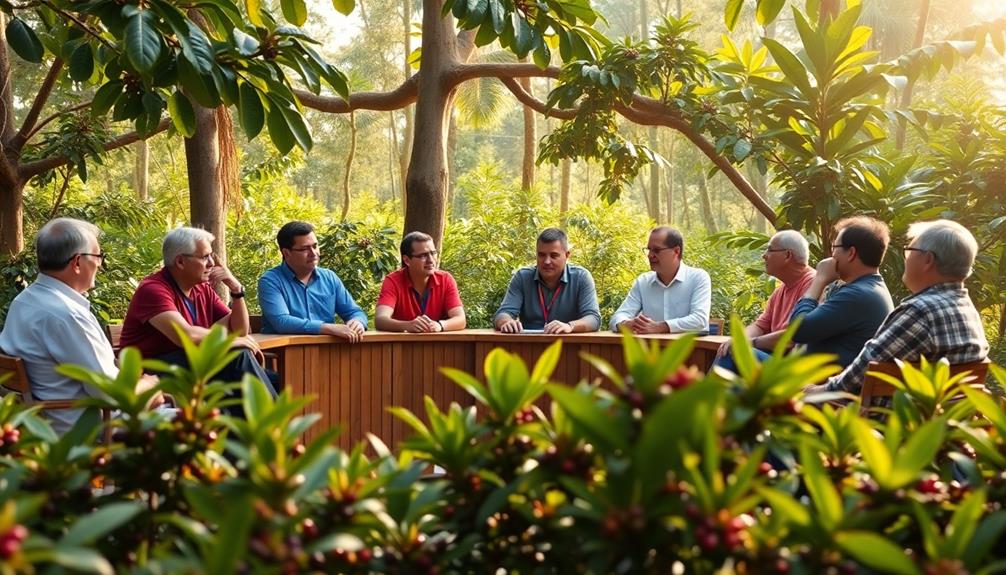
Five experts from organizations like TechnoServe and the Ethiopian Coffee and Tea Authority recently gathered for a panel discussion focused on coffee forest conservation. They highlighted the significant role of coffee forests in promoting sustainability and biodiversity, akin to the benefits of energy-efficient systems in reducing environmental impact.
The panelists shared insights on the economic potential of premium wild coffee, emphasizing that incentivizing forest conservation can benefit both smallholder farmers and the environment.
Innovative supply chain strategies were discussed to promote forest-grown coffee, aiming to connect consumer demand with sustainable practices. The experts explored the importance of preserving coffee forests, which serve as a genetic bank for Arabica varietals essential for biodiversity and climate resilience.
As coffee forests face increasing threats, the necessity for robust conservation efforts has never been more urgent.
The panel emphasized collaboration between the coffee industry and local communities, underlining that supporting the livelihoods of smallholder farmers is essential for successful conservation.
By fostering partnerships, the industry can guarantee that these important ecosystems are preserved, enriching both the environment and the communities that depend on them.
This approach not only protects biodiversity but also sustains the heritage of coffee cultivation for future generations.
Supporting Local Communities
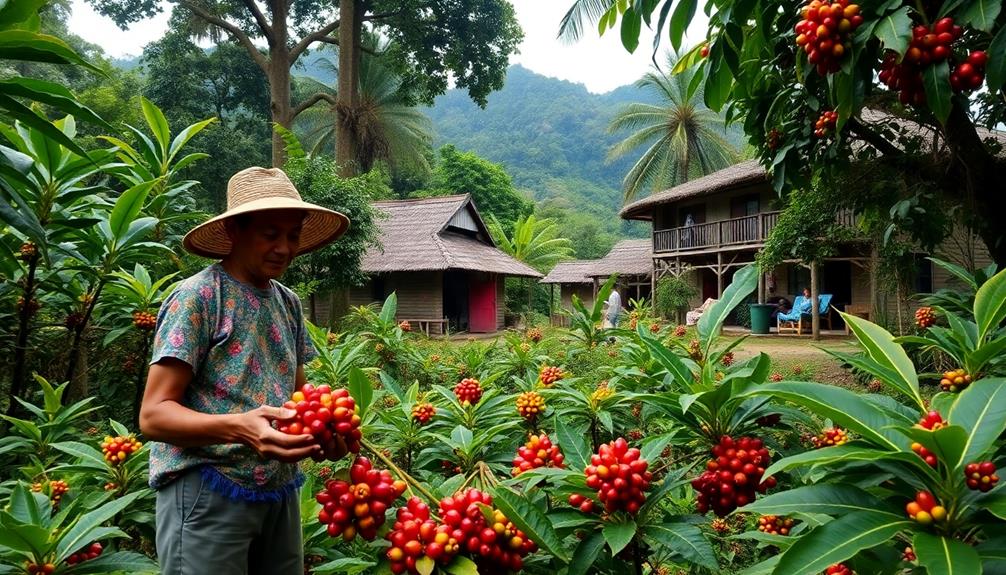
Empowerment lies at the heart of supporting local communities engaged in coffee production. By focusing on smallholder farmers, you can help enhance their economic stability and resilience against climate change. This approach not only uplifts individual livelihoods but also fosters a sense of community involvement that's essential for sustainable practices.
To effectively support these communities, consider the following:
- Training and Resources: Collaborate with organizations like TechnoServe to provide training that equips farmers with the skills needed for better yields and improved quality of coffee.
- Promoting Sustainable Practices: Encourage methods that preserve coffee forests, ensuring biodiversity and unique flavor profiles that enhance market value.
- Implementing EUDR Regulations: Help local farmers adapt to regulations that promote environmental conservation while boosting their economic prospects.
Future of Coffee Conservation
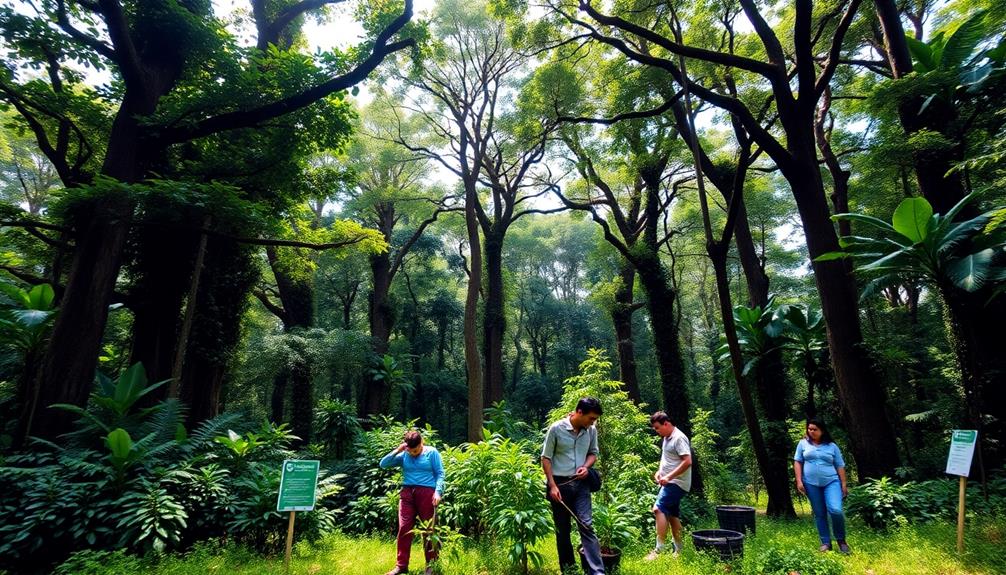
The future of coffee conservation hinges on our collective commitment to preserving Ethiopia's remaining coffee forests, which play a crucial role in sustaining biodiversity and supporting the livelihoods of smallholder farmers. By promoting premium forest coffee, we can drive economic growth in rural areas while encouraging sustainable practices that protect the environment.
Collaborating with organizations like TechnoServe and Partnerships for Forests is essential for developing effective strategies that integrate conservation with coffee farming. Educational programs aimed at consumers will raise awareness about the value of forest coffee and its role in conservation efforts.
Here's a quick overview of the strategies that can shape the future of coffee conservation:
| Strategy | Impact |
|---|---|
| Promote premium forest coffee | Drives economic growth |
| Support smallholder farmers | Guarantees livelihoods and stability |
| Implement sustainable practices | Protects biodiversity and ecosystems |
| Educate consumers | Raises awareness and demand |
The long-term vision for Ethiopian coffee includes enhancing the resilience of coffee ecosystems against climate change while guaranteeing the economic stability of communities dependent on coffee production. Together, we can secure a sustainable future for coffee conservation.
Frequently Asked Questions
How Can I Get Involved in Coffee Forest Conservation Efforts?
You can get involved in coffee forest conservation efforts by volunteering with local organizations, donating to conservation projects, participating in educational workshops, and spreading awareness through social media. Every action you take makes a difference!
What Are the Main Threats to Coffee Forests in Ethiopia?
The main threats to coffee forests in Ethiopia include deforestation, climate change, and invasive species. You can help by raising awareness, supporting sustainable practices, and advocating for policies that protect these essential ecosystems for future generations.
Are There Certifications for Sustainably Sourced Ethiopian Coffee?
You'd think sustainable Ethiopian coffee would just brew itself, right? Actually, there are certifications like Fair Trade and Rainforest Alliance that guarantee your cup's not only tasty but also kind to the environment.
How Does Climate Change Impact Coffee Forest Ecosystems?
Climate change disrupts coffee forest ecosystems by altering temperatures and precipitation patterns. You'll notice increased pests and diseases, reduced yields, and shifts in suitable growing areas, making sustainable management essential for preserving these important habitats.
What Are the Benefits of Forest Coffee for Consumers?
Forest coffee offers you unique flavors, supports biodiversity, and promotes sustainable farming practices. You enjoy a richer taste while knowing your choice helps preserve ecosystems, benefiting both local communities and the environment in the long run.
Conclusion
In the vibrant tapestry of coffee forests, your role is essential. By embracing sustainable practices, you're not just brewing a cup of coffee; you're nurturing the planet's pulse. Each smallholder farmer you support becomes a guardian of this lush landscape, ensuring its health for generations. As you sip your next brew, remember—you're part of a larger story, one where conservation and community thrive hand in hand, creating a rich blend of hope for our future.
In the vast and diverse world of coffee, coffee alternatives, and tea, Olivia has found her calling. As an author and a dedicated coffee and tea aficionado, her work for Cappuccino Oracle reflects her profound love and understanding of the intricate complexities found within these beverages. Olivia’s passion for the subject serves as both a catalyst for her creativity and a connection point with her audience.
Olivia’s appreciation for coffee, coffee alternatives, and tea blossomed at an early age. She discovered that these beverages invigorated her senses and stimulated her creative spirit. From the nuanced flavors of single-origin roasts to the captivating narratives intertwined with coffee, coffee alternatives, and tea trade and culture, Olivia found an unlimited source of inspiration in her daily cup.
Her love for these beverages and her talent for storytelling eventually converged at Cappuccino Oracle. As an author, Olivia’s mission is to illuminate the intricate tapestry that makes up the world of coffee, coffee alternatives, and tea. Her articles span a diverse range of topics, encompassing everything from the unique flavors of different brews to the sociocultural history intertwined with their cultivation and consumption.
Sustainable and Ethical Tea Sourcing
Future of Sustainable Coffee
Discover how innovative practices and consumer demand are reshaping the future of sustainable coffee, but what challenges lie ahead for smallholder farmers?
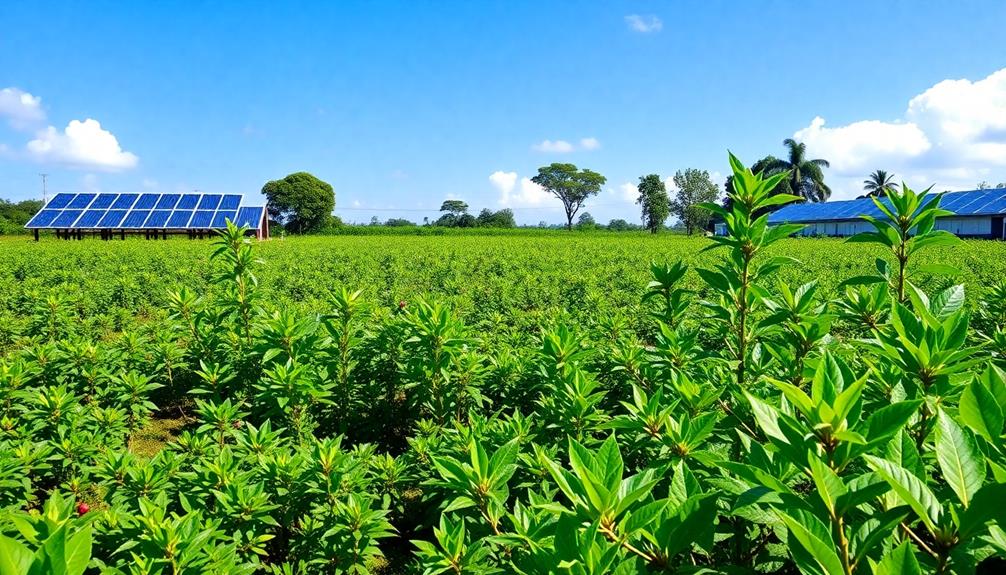
The future of sustainable coffee is all about adapting and innovating. As climate challenges threaten coffee production, you'll see farmers adopting new methods like precision agriculture and agroforestry. They're also developing resilient coffee varieties to combat pests and diseases. Consumer demand for ethically sourced coffee is rising, with many willing to pay extra for sustainable options. This change boosts smallholder farmers, who create 60% of the world's coffee, ensuring fair trade and improved incomes. The coffee industry is collaborating intensely on these efforts, and there's more to uncover about this evolving landscape.
Key Takeaways
- By 2050, climate-resilient Arabica coffee varieties will be crucial as suitable land is projected to halve due to rising temperatures.
- Sustainable practices, including precision agriculture and agroforestry, will enhance yields and biodiversity, helping farmers adapt to climate challenges.
- Increased consumer demand for ethically sourced coffee will drive industry shifts toward sustainable practices and responsible sourcing.
- Collaborative initiatives like the Sustainable Coffee Challenge aim to establish coffee as the first sustainable agricultural product, benefiting producers and the environment.
- Investments in fair trade and financing opportunities are essential for supporting smallholder farmers and ensuring stable incomes amidst price volatility.
Climate Challenges Facing Coffee
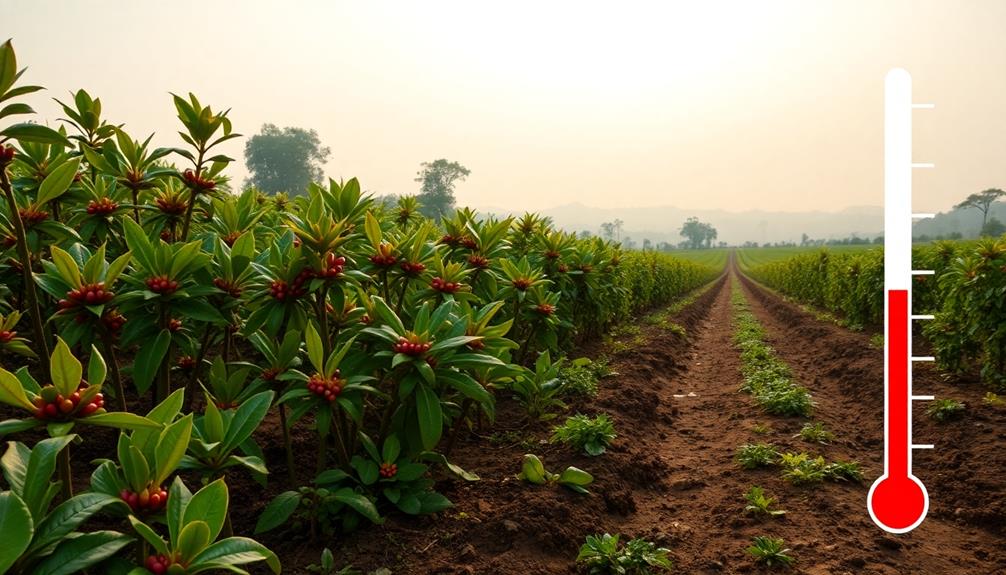
Climate change is reshaping the landscape of coffee cultivation, posing significant challenges for farmers and consumers alike. By 2050, it's projected that suitable land for Arabica coffee will be halved, jeopardizing global coffee production.
As temperatures rise, pests and diseases are becoming more prevalent, further disrupting coffee farming and threatening the livelihoods of smallholder farmers. Additionally, research shows that coffee can aid in liver health by reducing liver enzyme levels, highlighting the importance of preserving coffee quality.
Extreme weather events like droughts and floods are disrupting harvest cycles, adding urgency to the need for effective adaptation strategies.
Soil erosion in coffee-growing regions is another critical issue, impacting both the quality and yield of high-quality coffee. To combat these challenges, sustainable practices must be prioritized.
You can support smallholder farmers by advocating for and choosing coffee brands that invest in sustainability. This not only helps maintain the coffee supply chain but also reduces the environmental footprint associated with coffee production.
Innovations in Sustainable Practices
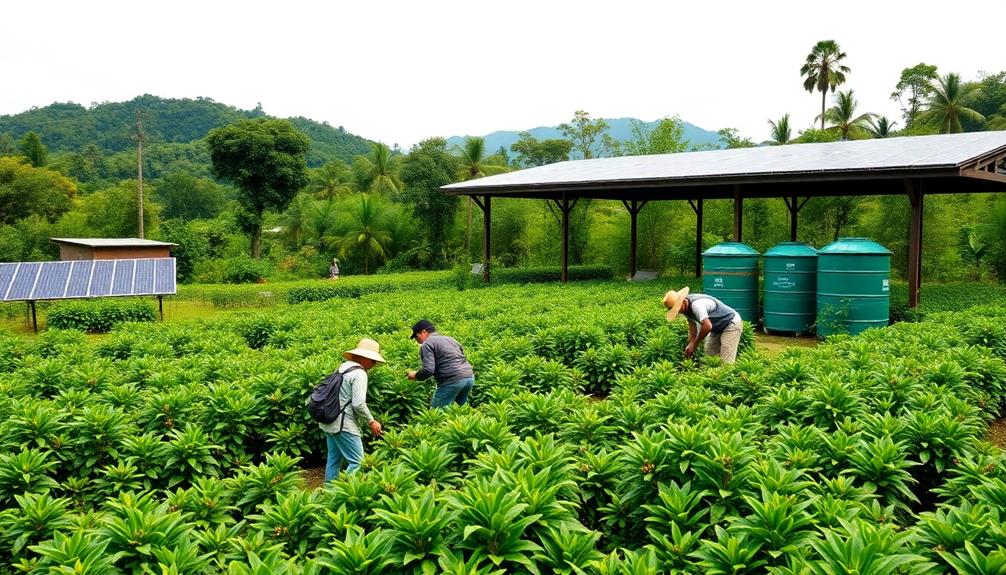
As coffee farmers face mounting challenges from climate change, innovative sustainable practices are emerging to help them adapt and thrive. These advancements not only improve crop yields but also support the environment.
Here are some key innovations making a difference:
- Precision agriculture technologies enhance yield management, allowing you to optimize resource use effectively.
- The Arabica Breeding Network focuses on developing climate-resilient coffee varieties, with around 100 new varieties set to be released soon.
- Agroforestry practices, as seen in Nespresso's initiatives, boost biodiversity and aim to sequester significant carbon emissions.
- Adoption of compostable packaging reduces landfill waste, providing a more sustainable solution to single-use plastics.
- Companies like Starbucks are committed to training farmers through open-source agronomy, targeting 200,000 farmers to improve sustainable practices.
These innovations not only foster a sustainable supply chain but also emphasize ethical sourcing, ensuring that the coffee industry can thrive in a changing climate.
Economic Impact on Farmers
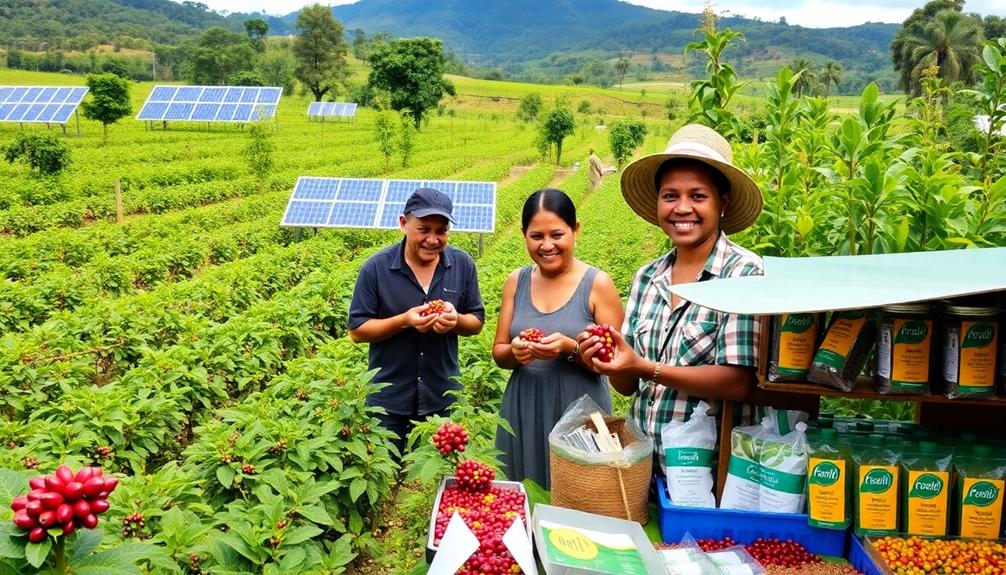
Innovative sustainable practices not only benefit the environment but also have a significant impact on the economic stability of coffee farmers. Smallholder farmers, who produce around 60% of the world's coffee, often struggle with price volatility in the coffee market. This instability directly affects their incomes, making financial support essential. Fair trade initiatives aim to guarantee equitable pricing, enhancing the financial stability of coffee producers.
Additionally, incorporating health benefits of rapeseed honey can provide farmers with alternative income sources through beekeeping, promoting biodiversity and improving crop health.
To meet the growing global coffee demand, an estimated $452 million in annual investment is necessary. This underscores the importance of targeted investments to bolster the livelihoods of smallholder farmers. Programs like the Starbucks Global Farmer Fund, which commits $50 million to finance farmers, play a significant role in strengthening local coffee economies. These investments provide crucial resources that enhance production resilience and promote sustainable agricultural practices.
While adopting environmentally friendly methods can be costly initially, they often lead to higher net returns over time. Improved soil health and biodiversity contribute to better crop yields and quality, ultimately benefiting farmers financially.
Industry Collaborations for Resilience
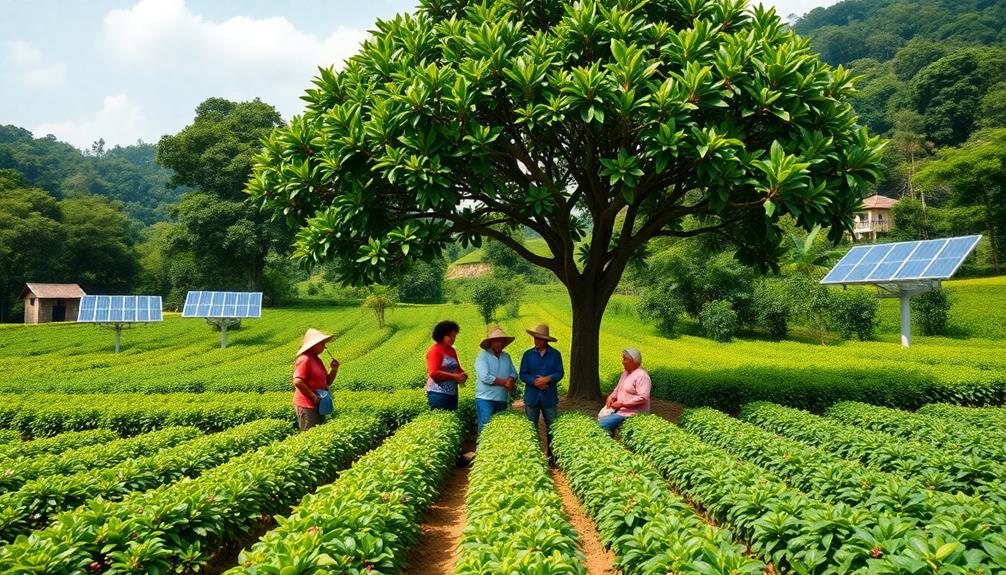
Industry collaborations are essential for building resilience in coffee production, especially as environmental challenges intensify. Through partnerships, the coffee industry is making strides toward developing climate-resilient varieties and enhancing sustainable practices. You might be surprised to learn how collaborative efforts are transforming coffee ecosystems.
Here are some impactful initiatives:
- Distribution of over 3 million seeds of resilient coffee varietals to smallholder farmers.
- The Innovea Global Arabica Breeding Network testing new varieties across diverse environments.
- Starbucks' Hacienda Alsacia, a research hub for high-yielding coffee innovations.
- The Sustainable Coffee Challenge, with over 155 international partners focused on collective goals for producer income.
- Enhanced financing opportunities to support sustainable practices in coffee production.
These industry collaborations not only address the pressing challenge of climate change but also work to guarantee environmental resilience within coffee farming.
Consumer Demand and Awareness
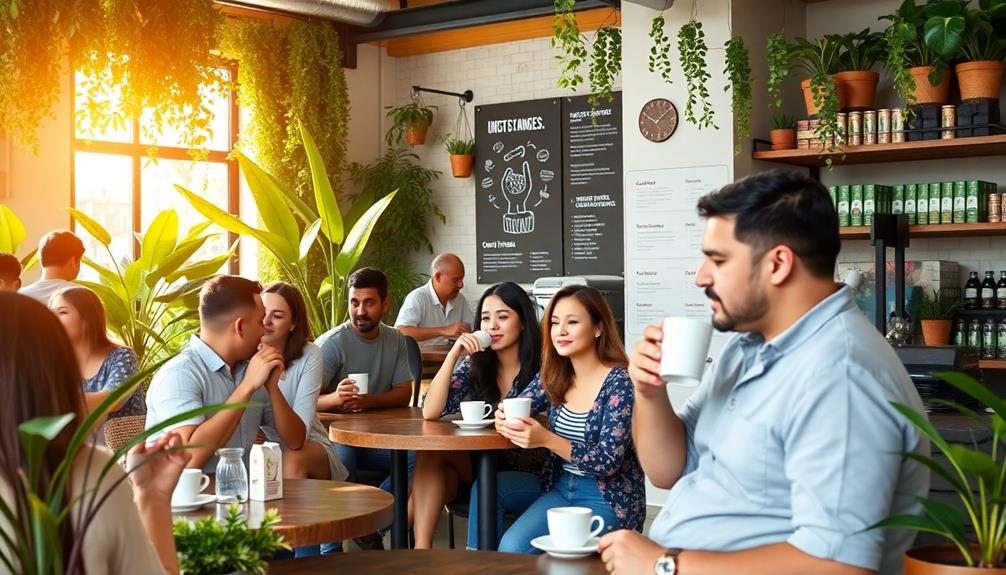
A growing number of consumers are prioritizing sustainability when choosing their coffee, greatly influencing how brands operate. As awareness about the importance of ethical and sustainable practices rises, you're likely among the 76% of consumers concerned about climate change impacts on coffee production. This diverse consumer demand is pushing brands to adopt responsible sourcing and transparent supply chains.
| Consumer Insights | Impact on Brands |
|---|---|
| 58% willing to pay more | Increased focus on ethical sourcing |
| 66% recognize certifications | Importance of Fair Trade & Rainforest Alliance |
| 70% would switch brands | Demand for sustainable options |
| 155+ partners in challenges | Collective effort for sustainability |
| Educational campaigns | Boost in consumer interest |
These statistics highlight how essential it is for brands to align with sustainable solutions. The Sustainable Coffee Challenge aims to guarantee coffee becomes the world's first sustainable agricultural product. As you choose your coffee, remember that your preferences drive change, urging brands to meet the growing call for sustainability and transparency in the coffee industry. Your choices matter.
Frequently Asked Questions
Is There a Future for Sustainable Coffee Production?
Yes, there's a future for sustainable coffee production. You'll see increased demand for ethically sourced options, driven by consumer awareness. Innovations in farming practices and industry commitments will shape a more sustainable coffee landscape.
What Will Coffee Be Like in the Future?
Imagine sipping a cup of coffee grown using precision agriculture, where drones monitor plant health. In the future, you'll enjoy coffee that's not only delicious but also resilient, ethically sourced, and environmentally friendly.
Can the Coffee Industry Be Sustainable?
Yes, the coffee industry can be sustainable. By adopting eco-friendly practices and supporting fair trade, you'll not only help protect the environment but also improve farmers' livelihoods, ensuring a better future for everyone involved.
What Is the Future Outlook for the Coffee Industry?
You'd think coffee's future is all lattes and sunshine, but it's more like a caffeine-fueled rollercoaster. As climate change shakes things up, expect innovation, collaboration, and a caffeine-fueled race toward sustainability. Buckle up!
Conclusion
In steering the future of sustainable coffee, it's clear that collective action is as essential as the morning sun to a coffee plant's growth. By embracing innovative practices, addressing economic challenges, and fostering collaboration, you can help create a resilient coffee industry that thrives despite climate challenges. Your choices as a consumer matter, and by supporting sustainable brands, you're not just enjoying a cup of coffee; you're contributing to a brighter, greener future for all.
In the vast and diverse world of coffee, coffee alternatives, and tea, Olivia has found her calling. As an author and a dedicated coffee and tea aficionado, her work for Cappuccino Oracle reflects her profound love and understanding of the intricate complexities found within these beverages. Olivia’s passion for the subject serves as both a catalyst for her creativity and a connection point with her audience.
Olivia’s appreciation for coffee, coffee alternatives, and tea blossomed at an early age. She discovered that these beverages invigorated her senses and stimulated her creative spirit. From the nuanced flavors of single-origin roasts to the captivating narratives intertwined with coffee, coffee alternatives, and tea trade and culture, Olivia found an unlimited source of inspiration in her daily cup.
Her love for these beverages and her talent for storytelling eventually converged at Cappuccino Oracle. As an author, Olivia’s mission is to illuminate the intricate tapestry that makes up the world of coffee, coffee alternatives, and tea. Her articles span a diverse range of topics, encompassing everything from the unique flavors of different brews to the sociocultural history intertwined with their cultivation and consumption.
Sustainable and Ethical Tea Sourcing
Sustainable Coffee Processing Methods
Witness the eco-friendly evolution of coffee processing methods that tantalize the taste buds while preserving the planet—discover the impact of your brew today!
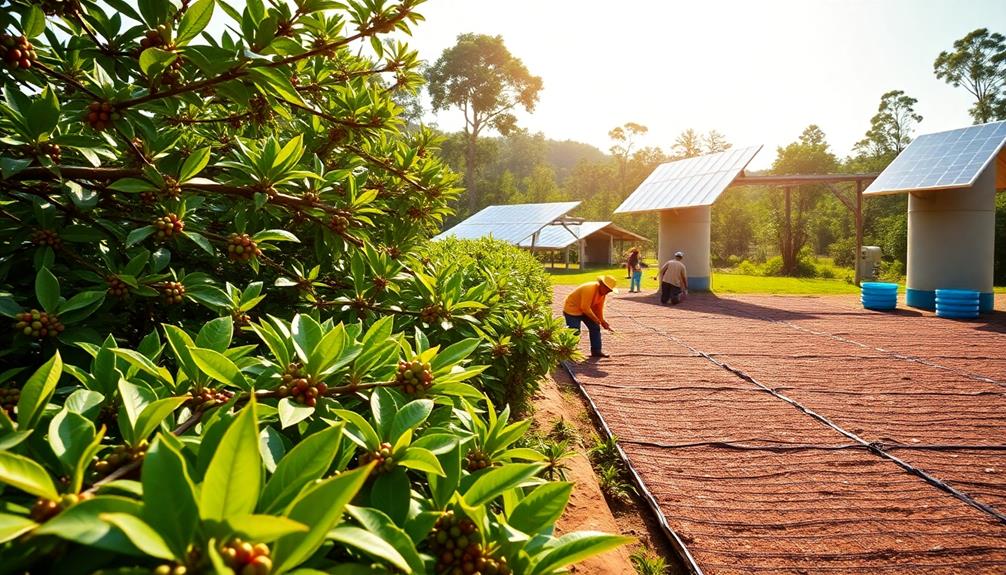
When you explore sustainable coffee processing methods, consider natural processing. This technique uses minimal water, often under one liter per kilogram, compared to washed processing, which wastes about ten liters. It's labor-intensive but delivers bold, fruity flavors that many coffee lovers crave. By choosing these methods, you not only enjoy a delicious brew but also support eco-friendly practices that reduce environmental impact. Innovations like anaerobic fermentation further enhance quality and market value. If you're curious about more sustainable practices and their benefits, there's plenty more to uncover about how they impact both flavor and our planet.
Key Takeaways
- Natural processing uses minimal water, making it a more sustainable option compared to washed processing, which consumes significantly more water.
- Eco-friendly techniques like anaerobic fermentation enhance coffee quality and can yield higher market prices, promoting sustainable practices.
- Waste management through effective treatment reduces pollution and supports healthier ecosystems, crucial for sustainable coffee production.
- Diversifying revenue by repurposing coffee pulp into products like cascara tea can boost farmers' income while minimizing waste.
- Certifications like fair trade ensure responsible sourcing and fair prices for farmers, promoting sustainable farming practices and community development.
Overview of Coffee Processing Methods

When it comes to coffee processing, understanding the different methods is essential for appreciating the flavors in your cup. Two primary methods stand out: natural and washed processing.
Natural processing involves sun-drying the cherries intact, which results in bold and fruity flavors. This method uses less than one liter of water per kilogram, making it a more sustainable coffee option. However, it's labor-intensive and requires careful monitoring to avoid defects.
On the other hand, washed processing uses around 10 liters of water per kilogram and emphasizes clean, high-acidity flavors. This method involves fermentation and flotation tanks, resulting in a more consistent product but with a higher environmental impact.
The choice between these processing methods greatly affects the quality and marketability of coffee. Naturally processed coffees often command higher prices due to their unique flavor profiles, highlighting the importance of sustainable coffee practices.
Environmental Impact of Processing
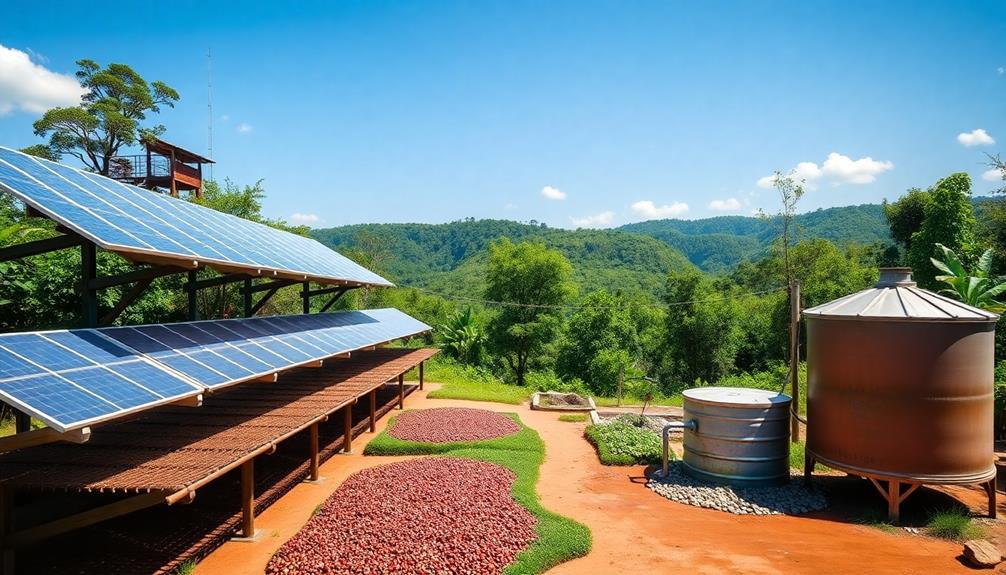
Many coffee lovers may not realize that the method used to process coffee beans can greatly impact the environment. The washed processing method, while popular, requires about 10 liters of water per kilogram of dry coffee. This significant water usage can contribute to scarcity in drought-prone regions.
In contrast, natural processing methods use less than one liter of water per kilogram, making them much more sustainable and environmentally friendly, especially in areas where water is limited.
Additionally, improper wastewater treatment from washed coffee processing can lead to pollution that harms local ecosystems and wildlife. This highlights the urgent need for effective wastewater management practices to mitigate the environmental impact of coffee processing.
By opting for sustainable processing methods, you can enhance environmental health, promote responsible water treatment, and reduce waste, benefiting both the ecosystem and coffee farmers' livelihoods.
Ultimately, the choice of processing method directly affects the coffee industry's overall environmental footprint. Embracing natural processing methods not only minimizes water and energy requirements but also supports a more sustainable future for coffee production and the planet.
Economic Viability in Coffee Production
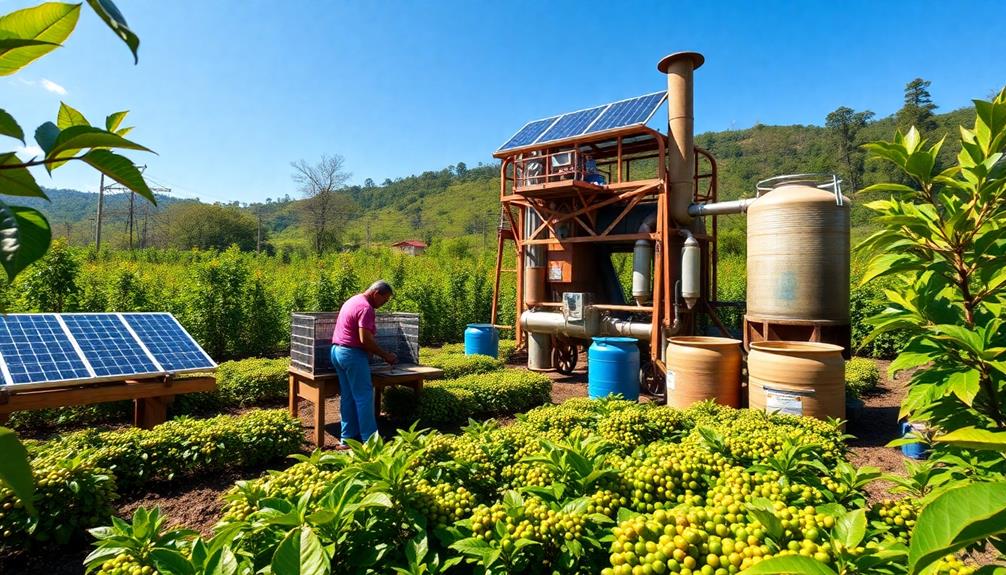
Economic viability in coffee production hinges on balancing environmental, social, and financial factors to guarantee farmers and their communities thrive. To achieve economic sustainability, you need to evaluate the financial implications of your processing methods. While experimental techniques can fetch higher market prices, they often lack the stability necessary for consistent income. Poorly executed methods can lead to low-quality coffee, harming your earnings and reputation in the market.
Moreover, the pressure to adopt risky processing methods without adequate knowledge can jeopardize your financial sustainability. Instead, diversifying revenue streams can help you maintain economic viability. For example, repurposing coffee pulp for cascara tea or fertilizer not only boosts your income but also supports sustainable practices.
Here's a summary of economic factors to assess:
| Factor | Description |
|---|---|
| Economic Sustainability | Balancing environmental, social, and financial aspects |
| Financial Sustainability | Ensuring consistent income and market stability |
| Diversified Revenue Streams | Repurposing by-products for additional income |
Innovative Sustainable Practices

You can explore eco-friendly processing techniques that not only benefit the environment but also enhance the quality of your coffee.
Implementing waste reduction strategies, like repurposing coffee pulp, helps create new revenue streams while minimizing waste.
Eco-Friendly Processing Techniques
Innovative sustainable processing techniques are transforming the coffee industry, offering both environmental benefits and higher profit margins. One standout method is anaerobic fermentation, which can yield market prices up to $54.10 per pound. This not only enhances the coffee's quality and unique flavors but also boosts your profits.
Natural processing methods, where coffee cherries are sun-dried without water, exemplify environmental sustainability in coffee processing. They require less than one liter of water per kilogram compared to the washed method, which uses about 10 liters.
Additionally, repurposing coffee pulp into cascara tea and fertilizer reduces waste while creating extra income for producers.
Effective wastewater management is essential too. By filtering organic matter and treating wastewater with probiotics, you can greatly lessen pollution and foster healthier ecosystems around your processing facilities.
Lastly, implementing shade-grown coffee and agroforestry practices enhances biodiversity and enriches soil fertility. These techniques create microclimates that support stronger coffee plants and act as carbon sinks, helping mitigate climate change.
Waste Reduction Strategies
The coffee industry is making strides not just in eco-friendly processing techniques but also in waste reduction strategies that are reshaping sustainability practices. You can contribute to these efforts by embracing innovative practices that minimize waste and enhance your experience.
One effective method is repurposing coffee pulp into cascara tea or fertilizer, which not only reduces waste but also creates new revenue streams for farmers. Implementing composting practices for coffee grounds enriches soil health and diverts waste from landfills. Additionally, using reusable coffee filters and compostable brewing options can greatly reduce single-use waste in your home brewing or at your favorite coffee shop.
Here's a quick overview of waste reduction strategies:
| Strategy | Benefits | Implementation Example |
|---|---|---|
| Repurposing Coffee Pulp | Additional revenue, less waste | Selling cascara tea |
| Composting Practices | Soil enrichment, ecosystem restoration | Composting coffee grounds |
| Reusable Coffee Filters | Reduces waste, cost-effective | Discounts for reusable cups |
Encouraging coffee shops to offer incentives for using reusable cups promotes responsible consumption. By adopting these practices, you can actively support sustainability in the coffee industry.
Quality Assurance in Coffee Processing
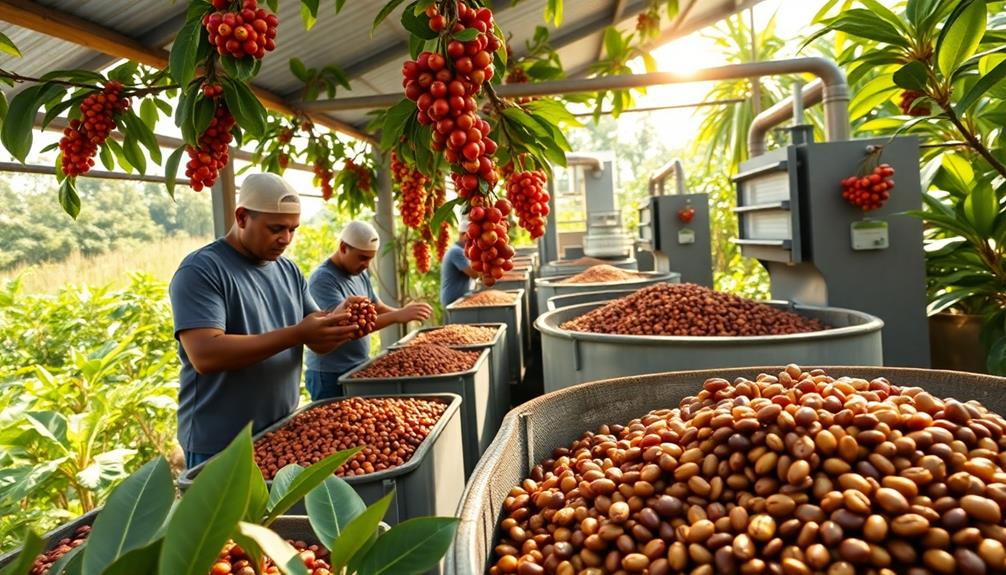
When you think about quality assurance in coffee processing, it's clear that control is key.
By selecting reputable producers, you guarantee that the beans are processed correctly, maintaining their unique flavor profiles.
Tasting tables play an essential role in helping you identify the distinct characteristics that separate high-quality coffees from the rest.
Importance of Quality Control
Quality control in coffee processing is essential for ensuring that consumers receive a product that meets their expectations for flavor and freshness. High-quality natural coffees offer clean and juicy flavors, showcasing a diverse bouquet of tastes developed during extended fermentation. To achieve this, it's vital to implement rigorous quality assurance measures throughout the processing stages.
By sourcing from reputable producers, you can guarantee that the coffee beans are closely monitored and adhere to best practices. Tasting tables play a key role in distinguishing the unique characteristics of processed coffees, highlighting the impact of quality control in your offerings.
As consumer awareness grows regarding the quality of naturally processed coffees, you'll find that customers prefer high-quality products. This preference drives demand for responsible sourcing, ultimately supporting sustainable farming practices.
Moreover, implementing effective quality control can mitigate risks associated with experimental processing methods. This not only enhances marketability but also boosts income potential for farmers.
Selecting Reputable Producers
How can you guarantee that the coffee you source meets high standards of quality? One of the most effective ways is by selecting reputable producers. When you collaborate with these producers, you ascertain that the coffee beans you receive are of high quality, showcasing clean and juicy flavors that are essential for consumer satisfaction.
By focusing on the fermentation and drying stages during processing, you can prevent defects and promote the unique characteristics of natural coffees. Reputable producers often employ meticulous quality assurance techniques, which are reflected in the diverse bouquet of tastes their coffees provide.
Tasting tables can reveal the distinct nuances between processing methods, reinforcing the need to choose producers who consistently excel in their craft.
Moreover, working with these producers supports sustainable farming practices, positively impacting the coffee supply chain and contributing to environmental and social responsibility. As consumers become more aware of quality sourcing, their demand for premium coffees will drive the industry towards more sustainable practices.
Ultimately, by selecting reputable producers, you're not just ascertaining quality; you're also investing in the future of coffee and its farmers.
Tasting and Flavor Profiles
Tasting coffee is an essential experience that reveals the intricate flavor profiles shaped by various processing methods. When you engage in coffee tasting at tasting tables, you'll notice that high-quality natural coffees stand out with their clean and juicy flavors. These coffees often present a diverse bouquet of tastes that differentiate them from washed varieties, showcasing the impact of their unique processing.
As you explore these flavor profiles, you'll appreciate how well-produced natural coffees typically command higher market prices. This reflects not only their distinct characteristics but also the meticulous care taken during processing.
Quality assurance is significant here; sourcing from reputable producers guarantees that these high standards are maintained throughout every stage of coffee production.
Your awareness as a consumer plays a critical role in supporting sustainable farming practices. By choosing well-processed, high-quality coffees, you help drive demand for products that prioritize quality assurance. This encourages producers to invest in sustainable methods that enhance flavor while protecting the environment.
Ultimately, your tasting journey not only delights your palate but also contributes to a more sustainable coffee industry.
Role of Packaging in Sustainability

Emphasizing sustainable packaging solutions is essential for reducing the environmental impact of coffee production. By opting for compostable and recyclable options, you can greatly minimize waste generated from traditional coffee packaging materials. Companies like MTPak Coffee focus on customizable packaging that highlights the unique qualities of sustainably processed coffee, promoting awareness and consumer preference for eco-friendly products.
| Packaging Type | Benefits | Environmental Impact |
|---|---|---|
| Compostable | Breaks down easily, enriches soil | Reduces landfill waste |
| Recyclable | Can be reused multiple times | Lowers resource extraction |
| Biodegradable | Decomposes naturally, safe for wildlife | Decreases pollution levels |
Supporting Ethical Coffee Sourcing
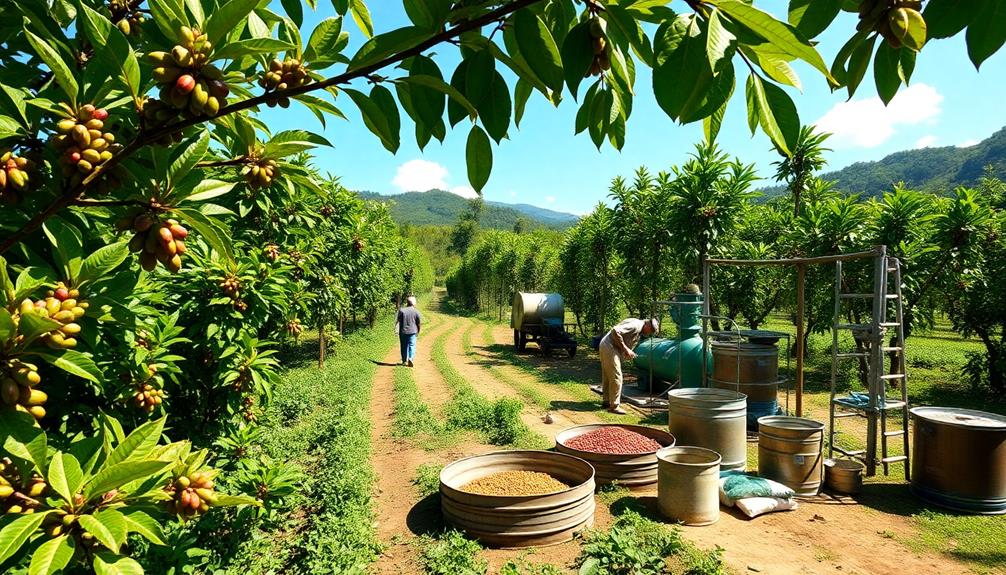
While enjoying your morning cup of coffee, consider the impact of your choices on the environment and local communities. By opting for brands that prioritize ethical sourcing, you can support sustainable farming practices that benefit both the planet and the people who grow your coffee.
Engaging in mindful consumption can also help align with a more positive vibrational state, enhancing your overall well-being and contributing to a healthier planet Law of Attraction principles. Look for certifications like fair trade or Rainforest Alliance, which guarantee that farmers receive fair prices for their crops, covering production costs and fostering community development.
Java Love offers a selection of fair trade coffees, such as Light Roast Ethiopia Sidama, Papua New Guinea, and Sumatra Mandheling. These options not only promote fair treatment of farmers but also encourage responsible cultivation methods.
Additionally, Rainforest Alliance certified coffees like the Viennese Blend and French Roast Colombia contribute to biodiversity conservation and sustainable land management.
When you choose ethically sourced coffee, you're promoting transparency in the supply chain and creating sustainable relationships between producers and consumers. This choice helps reduce poverty and supports the livelihoods of coffee farmers.
Frequently Asked Questions
What Are Sustainable Methods of Coffee Production?
When exploring sustainable coffee production methods, you'll find practices like organic farming, efficient water management, and fair trade principles. These approaches enhance biodiversity, support farmers, and promote environmental health, ensuring a better future for coffee cultivation.
What Is the Best Coffee Processing Method?
When you consider the best coffee processing method, you'll weigh flavor, quality, and marketability. You'll find natural processing offers sweetness, while washed processing provides clarity. Each method has its own unique benefits and challenges.
What Are the Three Coffee Processing Methods?
The three coffee processing methods are natural, washed, and honey. Each method influences flavor profiles markedly. You'll find bold tastes in natural, clean acidity in washed, and a mix of both in honey processing.
How to Make Coffee More Sustainable?
To make coffee more sustainable, you can choose ethically sourced beans, support local farmers, reduce water usage, and minimize waste. Engaging in eco-friendly practices not only helps the environment but also supports communities and enhances quality.
Conclusion
To sum up, adopting sustainable coffee processing methods not only benefits the environment but also enhances economic viability. Did you know that using eco-friendly processing techniques can reduce water usage by up to 90%? By embracing these innovative practices, you're not just improving the quality of your coffee; you're also contributing to a healthier planet. Remember, every cup of coffee you enjoy can support ethical sourcing and sustainable practices, making a positive impact on the world.
In the vast and diverse world of coffee, coffee alternatives, and tea, Olivia has found her calling. As an author and a dedicated coffee and tea aficionado, her work for Cappuccino Oracle reflects her profound love and understanding of the intricate complexities found within these beverages. Olivia’s passion for the subject serves as both a catalyst for her creativity and a connection point with her audience.
Olivia’s appreciation for coffee, coffee alternatives, and tea blossomed at an early age. She discovered that these beverages invigorated her senses and stimulated her creative spirit. From the nuanced flavors of single-origin roasts to the captivating narratives intertwined with coffee, coffee alternatives, and tea trade and culture, Olivia found an unlimited source of inspiration in her daily cup.
Her love for these beverages and her talent for storytelling eventually converged at Cappuccino Oracle. As an author, Olivia’s mission is to illuminate the intricate tapestry that makes up the world of coffee, coffee alternatives, and tea. Her articles span a diverse range of topics, encompassing everything from the unique flavors of different brews to the sociocultural history intertwined with their cultivation and consumption.
-

 Espresso Machines Reviews4 weeks ago
Espresso Machines Reviews4 weeks agoDeLonghi Eletta Explore: A Comprehensive Review [2025]
-

 Espresso Machines Reviews4 weeks ago
Espresso Machines Reviews4 weeks agoSUMSATY Espresso Machine Review (2025)
-

 Espresso Machines Reviews4 weeks ago
Espresso Machines Reviews4 weeks agoDeLonghi Magnifica S ECAM22.110.B Review: A Coffee Lover's Dream [2025]
-

 Cappuccino Oracle Selected Reviews4 weeks ago
Cappuccino Oracle Selected Reviews4 weeks agoBest Glass Water Bottles for Eco-Friendly Hydration [2025]
-

 Cappuccino Oracle Selected Reviews5 days ago
Cappuccino Oracle Selected Reviews5 days agoHighPlant HerbAblility Decarboxylator and Infusion Machine Review (2025)
-

 Espresso Machines Reviews3 weeks ago
Espresso Machines Reviews3 weeks agoGaggia Classic Evo Pro Espresso Machine Review [2025]
-

 Cappuccino Oracle Selected Reviews4 weeks ago
Cappuccino Oracle Selected Reviews4 weeks agoBest Onion Choppers for Efficient and Consistent Chopping [2025]
-

 Cappuccino Oracle Selected Reviews1 week ago
Cappuccino Oracle Selected Reviews1 week agoNinja JC151 NeverClog Cold Press Juicer Review



























